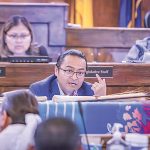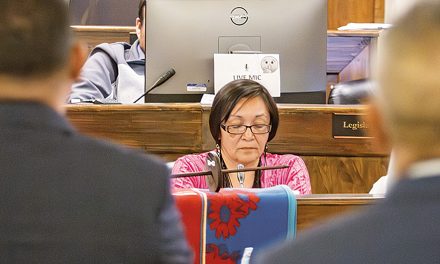
50 Years Ago: Coal mine contract becomes political
The Navajo Tribe received some really good news 50 years ago this week from the Peabody Coal Company. It was planning to start mining coal in the Black Mesa area near Kayenta after signing a contract with several utility companies that would provide Peabody $770 million, one of the biggest coal deals ever signed for Southwest coal.
It was good news for the tribe in two ways: it would get royalties for every ton of coal that was mined; and company officials said it would create 339 jobs, the great majority of which would go to Navajos.
According to the front-page article in that week’s Navajo Times, Peabody officials were really hyped about the Black Mesa site because of the low ash content of the coal buried there. Evidently, that kind of coal was highly sought by utility companies.
Navajo Tribal Chairman Raymond Nakai was also very happy with the news, saying the tribe would receive several hundred thousand dollars a year in royalty payments. It also didn’t hurt that the announcement came during his campaign for re-election.
So who wasn’t happy? For one, Nakai’s main challenger for the chairman position. Peter MacDonald pointed out that the tribe was getting only 20 cents a ton royalty, far less than other landowners where coal was being mined. For the next several years, MacDonald would point out that the tribe was getting a “can of Coke” for every ton that was mined.
He made it a priority once he was elected to try to get Peabody to renegotiate the contract but Peabody refused, pointing out that not only did the tribe sign the contract but so did the Secretary of the Interior as trustee for the tribe. Just when it appeared that the tribe would be stuck with the can of Coke per ton for the next two decades, tribal attorneys managed to acquire some internal documents from inside the Interior Department during the time the lease was under negotiation.
The documents included a memo from a department attorney, which questioned the 20 cents a ton royalty rate, pointing out that this was way below the market value of the coal. The tribal attorneys then filed a lawsuit against the Interior Department claiming that the federal agency failed its fidiciuary duties as trustee.
In the end, MacDonald got everything he wanted — a big bonus payment and a new rate of 12-and-a-half percent of he value of the coal after it was mined. Instead of making tens of thousands of dollars a year from the contract, the tribe would be making millions.
Speaking of MacDonald, Times editor Dick Hardwick stirred up a hornet’s nest when he relayed in that week’s editorial a rumor he had heard about MacDonald and his job as executive director of the Office of Navajo Economic Opportunity.
According to Hardwick, MacDonald, in his last months as ONEO director before stepping down to run against Nakai, was using agency community workers to encourage people to support his candidacy. The rumor was that they were doing this as they did their jobs, which was a big no-no.
Believing these rumors to be true, Council delegates supporting Nakai made several efforts in early 1970 to get MacDonald to step down. MacDonald refused, staying in his job until late May.
Although this was a rumor that had been spreading for months, putting it down in writing caused an immediate reaction from ONEO officials. The day after the editorial ran, Verne Curtis, head of ONEO’s community service program, issued a long statement saying the rumor was “completely false,” adding that he had been in contact with all the agency directors for the program and all said the same thing.
“If the editor has any proof that our community service workers had been engaged in tribal politics during work hours, he should produce the proof and we will take the appropriate action,” he said. Of course, Hardwick had no proof. That is why he called it a rumor in his editorial.
To put this in a little more perspective, there also had been reports that tribal employees who supported Nakai were seen dropping off campaign literature on behalf of Nakai during working hours.
And finally, sticking with the election, one of the candidates running for tribal chairman was promoting the idea of the Navajo Times becoming a national newspaper. “It would be nice if the Times was sold in larger cities and became a national newspaper,” said Franklin Eriacho.
When asked about that, Hardwick said the Times was sort of a national newspaper already, having subscribers in every state. The paper was also sold on newstands in Dallas, Phoenix and Albuquerque.








 Highway 264,
Highway 264, I-40, WB @ Winslow
I-40, WB @ Winslow